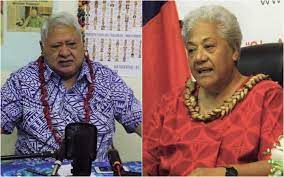Fifty plus electoral petitions and counter-petitions have been pushed back twice to allow the Courts to deal with constitutional issues that resulted in a Government in limbo.
Three Supreme Courts will be operating simultaneously on Monday next week to hear the electoral petitions – the last test for the winning members to secure 5 years tenure in Parliament.
The Appellate Court on Monday presided over a constitutional question on the interpretation of Article 44(1A) if the 10 per cent statutory requirement means 5 or 6 women in parliament.
Chaired by Chief Justice,Satiu Simativa Perese sitting with Justice Tafaoimalo Leilani Tuala-Warren and Justice Fepuleai Ameperosa Roma the decision has been reserved.
Aliimalemanu Alofa Tuuau was appointed as the 6th woman in Parliament by the Electoral Commissioner but that appointment was revoked by the Supreme Court.
That “unanimous” decision was appealed and the reserved decision of the Appeals Court will be delivered in a timely manner said Chief Justice Perese.
If the appeal is granted the country will return to a deadlock and is likely to head back to the polls.
If on the other hand the Appeal is dismissed then the Legislative Assembly will have one party with a majority of one seat.
Another separate case is brought by the Attorney General that seeks interim orders to stop the legal effect of the swearing in of 26 members of Parliament in an ad-hoc ceremony last week.
Those orders if granted will ultimately halt the transition of the Fa’atuatua i le Atua Samoa ua Tasi (FAST) party led Government that has a majority of one seat.
The party says they were forced to carry out the swearing-in of their 26 representatives on Monday evening last week after the Parliament doors were closed and the non-attendance of the Head of State, Clerk of the Legislative Assembly, Chief Justice and 25 elected members from the Human Rights Protection Party.
This followed two proclamations from the Head of State, the first being to call for Parliament to convene and the second to suspend his earlier proclamation. After FAST took it to court, the Supreme Court ordered for Parliament to convene on 24th May to comply with a Constitutional requirement for the assembly to meet within 45 days.
The Court also set aside a proclamation from the Head of State to suspend the assembly’s meeting until further notice.
But despite the orders from the Court the chamber remained locked and FAST went ahead with swearing in ceremony in the absence of the Head of State and other bureaucrats.
FAST claims that the ceremony, although done outside of Parliament and without the proper officials, was done on the principle of necessity to meet the Supreme Law requirement.
In disagreement, the Attorney General argued that the swearing-in ceremony was unconstitutional and unlawful.
That case is tentatively scheduled for Wednesday or Thursday this week for hearing.
One of the first constitutional challenges was one brought by the FAST party against a proclamation from the Head of State that voided results of 9th April General Election calling for fresh elections.
That proclamation was void and declared unconstitutional reinstating the results from April’s polling day. The case was not appealed.
SOURCE: SAMOA OBSERVER/PACNEWS













